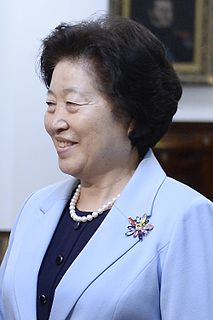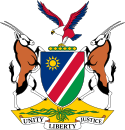The history of Namibia has passed through several distinct stages from being colonised in the late nineteenth century to Namibia's independence on 21 March 1990.

Samuel Shafiishuna Daniel Nujoma, is a Namibian revolutionary, anti-apartheid activist and politician who served three terms as the first President of Namibia, from 1990 to 2005. Nujoma was a founding member and the first president of the South West Africa People's Organization (SWAPO) in 1960. Prior to 1960, SWAPO was known as the Ovambo People's Organisation (OPO). He played an important role as leader of the national liberation movement in campaigning for Namibia's political independence from South African rule. He established the People's Liberation Army of Namibia (PLAN) in 1962 and launched a guerrilla war against the apartheid government of South Africa in August 1966 at Omungulugwombashe, beginning after the United Nations withdrew the mandate for South Africa to govern the territory. Nujoma led SWAPO during the lengthy Namibian War of Independence, which lasted from 1966 to 1989.
The music of Namibia includes a number of folk styles, as well as pop, rock, reggae, jazz, house and hip hop.

The Damara, plural Damaran are an ethnic group who make up 8.5% of Namibia's population. They speak the Khoekhoe language and the majority live in the northwestern regions of Namibia, however they are also found widely across the rest of the country.

Justus ǀUruhe ǁGaroëb is a Namibian traditional authority leader and politician. He was a staunch opponent of South African rule and led the oppositional Namibia National Front in the late 1970s. He became Gaob (king) of the Damara people in 1982 and founded the United Democratic Front (UDF) in 1989.

The Popular Democratic Movement (PDM), formerly the Democratic Turnhalle Alliance (DTA), is an amalgamation of political parties in Namibia, registered as one singular party for representation purposes. In coalition with the United Democratic Front, it formed the official opposition in Parliament until the parliamentary elections in 2009. The party currently holds 16 seats in the Namibian National Assembly and one seat in the Namibian National Council and is the official opposition. McHenry Venaani is president of the PDM.
The United Democratic Front (UDF) is a political party in Namibia. Justus ǁGaroëb founded the party in 1989 and led it until 2013. He was succeeded by Apius Auchab.

The Damara Christian Democratic Party was a political party in Namibia, initially known as the Damara Action Group. The party was formed in 1978 and led by Theophelus Arend.

The Namibia African People's Democratic Organisation (NAPDO) was a political party in Namibia, based amongst the Damara people. It was founded in 1970.

The Namibia People's Liberation Front was an alliance of moderate political parties in Namibia. It was formed in 1978 by the Voice of the People Party, the Damara Executive Committee and the Bondelswarts Council. The Damara Christian Democratic Party joined the NPLF in 1979, but withdrew in 1986.

The Namibia National Front (NNF) was an alliance of nationalist but moderate parties in Namibia. It was formed in 1977 as a merger of the Namibia National Convention and the Namibia National Council.

Bience Philomina Gawanas is a Namibian lawyer. She was appointed in January 2018 as Special Adviser on Africa for the United Nations after having served as Commissioner for Social Affairs at the African Union Assembly of Heads of State and Government, from 2002 to 2012. She was a Commissioner on the Public Service Commission in Namibia from 1991 to 1996, and an Ombudswoman in the Namibian Government from 1996 to 2003. She has also been a lecturer in Gender Law at the University of Namibia, Director of the Board of the Central Bank of Namibia, and involved in many non-governmental organizations including Secretary-General of the Namibian National Women's Organization and patron of Namibian Federation of Persons with Disabilities. As Chairperson of the Law Reform Commission she oversaw the passage of the Married Persons' Equality Act. The commission also did extensive work on Rape Acts and other important laws that were eventually passed after her time.

Otjiwarongo is a city of 28,000 inhabitants in the Otjozondjupa Region of Namibia. It is the district capital of the Otjiwarongo electoral constituency and also the capital of Otjozondjupa.

Khorixas is a town of 6,000 inhabitants in southern Kunene Region, Namibia. It was the capital of the Damaraland bantustan before Namibia's independence. It is the administrative capital of Khorixas Constituency. Most of the inhabitants are from the Damara ethnic group. The town is located near to an important deposit of petrified wood and the Twyfelfontein valley, known for its rock art.
Alan Overfield was born a First Nations person on Manitoulin Island and is considered to have been a Canadian white supremacist.

Sun Chunlan is a Chinese politician, a member of the Politburo of the Chinese Communist Party, and a Vice Premier of the People's Republic of China. From 2009 to 2014, Sun served in two prominent regional posts, first as Communist Party Secretary of Fujian province, then Party Secretary of Tianjin, one of China's four direct-controlled municipalities. Her tenure in Fujian made her the second female provincial-level party chief since the founding of the People's Republic of China in 1949. Between 2014 and 2017, she served as head of the United Front Work Department of the Central Committee of the Chinese Communist Party.

The Turnhalle Constitutional Conference was a conference held in Windhoek between 1975 and 1977, tasked with the development of a constitution for a self-governed Namibia under South African control. Sponsored by the South African government, the Turnhalle Conference laid the framework for the government of South West Africa from 1977 to independence in 1989.
Chief Frans Migub ǀGoagoseb is a Namibian politician and Damara leader. He is the party leader of the Namibian Democratic Movement for Change and was the party's candidate for president in the 2009 general election. In that election, ǀGoagoseb received 1,760 votes, placing eleventh out of twelve candidates for president. Only Attie Beukes of the Communist Party of Namibia received fewer votes than ǀGoagoseb.
The Damara Council was a political party in Damaraland, a Bantustan in South West Africa. In 1977 a breakaway faction joined the Democratic Turnhalle Alliance (DTA), while in 1989, the remainder of the DC was one of 8 political parties which formed the United Democratic Front. 6 of the 8 parties were ethnically affiliated, as they had taken part in the governments of various Bantustans. Since 1989, the UDF has maintained a presence in the National Assembly of Namibia, with Damara-speaking Namibians forming the core of the party.
Visolela Rosalinda "Rosa" Namises, nicknamed the "Rosa Luxemburg of Namibia", is a Namibian politician, human-rights activist and chief of a faction of the ǀKhomanin, a clan of the Damara people. She is a former member of Parliament and founding member and former secretary-general of the Namibian Congress of Democrats (CoD). A prominent voice on gender issues, human-rights violations, and violence against women and children in Namibia, she is the director of Woman Solidarity Namibia and works at the Dolam Residential Child Care centre, a day-care centre for vulnerable children.










